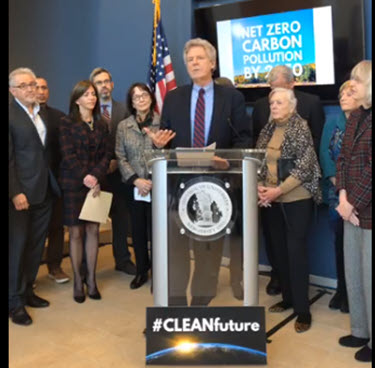The U.S. Environmental Protection Agency (EPA) announced ENERGY STAR program guidance this week to reflect changes in building operations due to the COVID-19 pandemic. The guidance was developed after EPA sought input from The Roundtable’s Sustainability Policy Committee Advisory Committee (SPAC).
- The EPA guidance – “Has COVID-19 affected ENERGY STAR certification?” – impacts real estate industry practices regarding the web-based “Portfolio Manager” tool used by more than 450,000 properties (or nearly 45% of U.S. commercial building space) to measure, benchmark, and track energy, water, and waste management in buildings. “Portfolio Manager” is a voluntary platform at the federal level for private sector buildings although a number of state and local laws mandate its use in major markets.
- EPA explained that building owners and managers should update Portfolio Manager “use details” to reflect changes in occupancy and operations that may have occurred since the start of the pandemic – for both the numbers of workers in a building and the asset’s weekly operating hours. (Point #1 in EPA’s guidance) The agency also provided practical instructions on how to update such “worker numbers” and “hours of operation” details in the Portfolio Manager tool.
- When merged with data on a building’s actual energy consumption, these “use details” are key variables to determine a 1-100 ENERGY STAR rating that allow investors, tenants, regulators, and other audiences to assess an asset’s energy performance compared to like-kind buildings.
- EPA staff sought input on these matters at SPAC’s “virtual meeting” on June 12, which was held in conjunction with The Roundtable’s remote Annual Meeting (Roundtable Weekly, June 12). SPAC members were surveyed for their recommendations about how ENERGY STAR should address changes in building operations during the pandemic. The committee’s preferred option is now reflected in EPA’s latest guidance.
- EPA plans to issue additional guidance (expected in September) to advise owners and managers on how to apply for ENERGY STAR certifications that may be awarded to buildings in 2020. (Point #3 in EPA’s guidance) The key clarification in this week’s announcement is that updating “use detail” data to reflect COVID-era operations is prerequisite for the ultimate ENERGY STAR “label,” which may be granted for a building that ranks “75” or higher on EPA’s scale.
- This week’s guidance is the latest example of longstanding cooperation between the ENERGY STAR program and SPAC. It follows collaborations to update the technical models that EPA currently uses to “score” buildings (Roundtable Weekly, July 19, 2019). SPAC also assisted the agency with developing the “ENERGY STAR Tenant Space” program to recognize high performance design and construction of leased office. (Roundtable Weekly, June 15, 2018)
- In related news, EPA opened its process for 2021 ENERGY STAR awards this week. Applications must be submitted by December 9, 2020 and can be downloaded here.
SPAC is led by Chairman Anthony E. Malkin (Chairman, President, and CEO, Empire State Realty Trust) and Vice Chairman Daniel Egan (Senior Vice President, Energy & Sustainability, Vornado Realty Trust).
# # #




